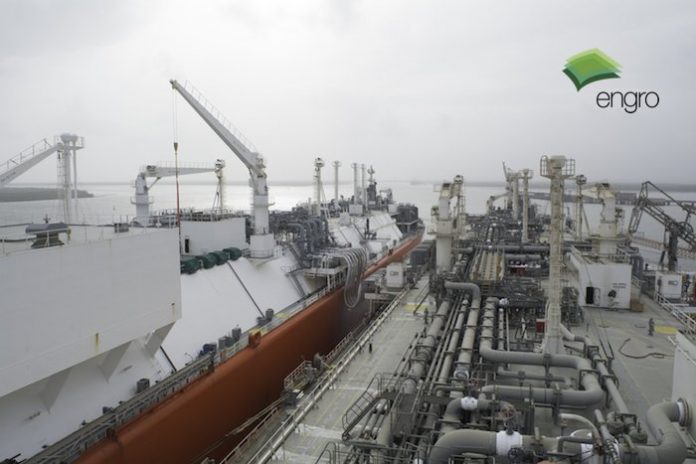KARACHI: As the conversion of fuel from diesel to liquefied natural gas (LNG) has started showing positive changes in the energy sector, the LNG terminals of Engro led private firms are going to reduce the gas deficit in Pakistan by 30 per cent besides saving huge amount annually.
The country’s first LNG terminal set up by conglomerate Engro Corp, in 2015, has reduced the gas deficit of the country by 15 per cent while its second terminal, which is expected to be there by early 2019, would reduce the deficit by 30 per cent.
These views were expressed by Engro LNG unit Elengy Terminal Pakistan Chief Executive Jihangir Piracha while talking to a journalists’ group during a visit to the terminal at Bin Qasim in Karachi. The visit was organised by Asian Development Bank (ADB). The ADB has invested $ 30 million in Engro Elengy Terminal Private Limited, a special purpose company to build Pakistan’s first liquefied natural gas (LNG) regasification terminal.
Piracha said after the successful operation of the first ever terminal, his firm is now finalising plans with Royal Dutch Shell, Fatima Group and trading house Gunvor for another terminal with the capacity of 4.5 million tons per year.
According to him, Pakistan has the gas deficit of about 2-3 billion cubic feet/day (BCFD), which has been reduced by 15 to 20 by the import of LNG and its regasification at the terminal. The 100 per cent utilisation of the Floating Storage and Regasification Unit (FSRU) at the Elengy terminal round the year makes it the only FSRU in the world which is operating at such high regas rates.
Apart from the visible reduction in gas shortages across the country, even in the winter season, the new gas being added by the terminal in the system, is also saving about $ 1.5 billion in import bill each year due to fuel exchange between Diesel and LNG.
The Engro Corp CEO said that at least 6.1 million tonnes of LNG have been handled since commissioning of the terminal in 100 shipments (25 via Q-Flex carriers, 74 conventional carriers). The terminal has the capacity to regas 600 mmscfd, biggest gas source in Pakistan.
Engro’s terminal is providing round-the-clock supply of natural gas at a utilization rate of 100 per cent for the FSRU. This achievement makes it the only FSRU in the world that is operating at such high re-gas rates. Engro is also one of just 15 companies in the world, which is operating at such an advanced terminal storage and regasification technology that enables such efficiencies.
Piracha said Engro Elengy terminal has proved to investors inside the country that the business model works leading to a dramatic investment in the ecosystem that will lead to 2-3 more terminals in the near future with even more profound and positive impact on the country’s energy situation. “Gas shortage will be eliminated, and cost of the tariff will be positively affected.”
Talking about its contribution in the energy sector, especially in setting up the country’s first ever LNG Terminal, a representative of ADB Pakistan, said the decision of ADB to invest in the private firm, which encouraged others to jump in, was aimed at meeting energy demands of the country. Since 2008, Pakistan has been suffering from crippling power shortages, caused by a lack of fuel, which has resulted in unscheduled industry shutdowns, power interruptions in cities, and public unrest. The country’s natural gas resources are also under severe strain with a recent survey showing that the rate of gas extraction is declining by over 2 per cent a year, even as demand accelerates. “Seeing the LNG regas as a fast, efficient and most viable source of fuel, ADB decided to finance the LNG project of Engro, to help the country overcome the energy crisis,” he said.
Briefing about the impacts of the LNG regas, officials at Engro claimed that the new gas brought online over 2,200MW power generation or switched from expensive liquid fuels. Besides, over 750 CNG stations were operated in Punjab for the first time, creating new hope for $ 4.5 billion industry. It also caused the revival of more than 500 industrial units mainly comprising of export-oriented textile.
According to them, Engro was able to construct and operate terminal of such complexity in a high risk country with known security concerns and issues for the benefit of the industry of Pakistan.
LNG is a cleaner fuel substitute to the expensive alternates in the form of Diesel, Furnace Oil, LPG and Kerosene, which are also unsafe for domestic use.
LNG as a fuel for power generation over Furnace Oil is more efficient in power generation (60 per cent efficiency on RLNG vs 45 per cent on alternate fuel), has much lower O&M costs and thus is friendlier on the economy in the form of much lower electricity tariff for the masses
Regasification converts LNG into natural gas, making it easier to store and distribute through pipelines to end users including power generators. The project will help avoid up to 2 million tonnes of greenhouse gas emissions a year.
























